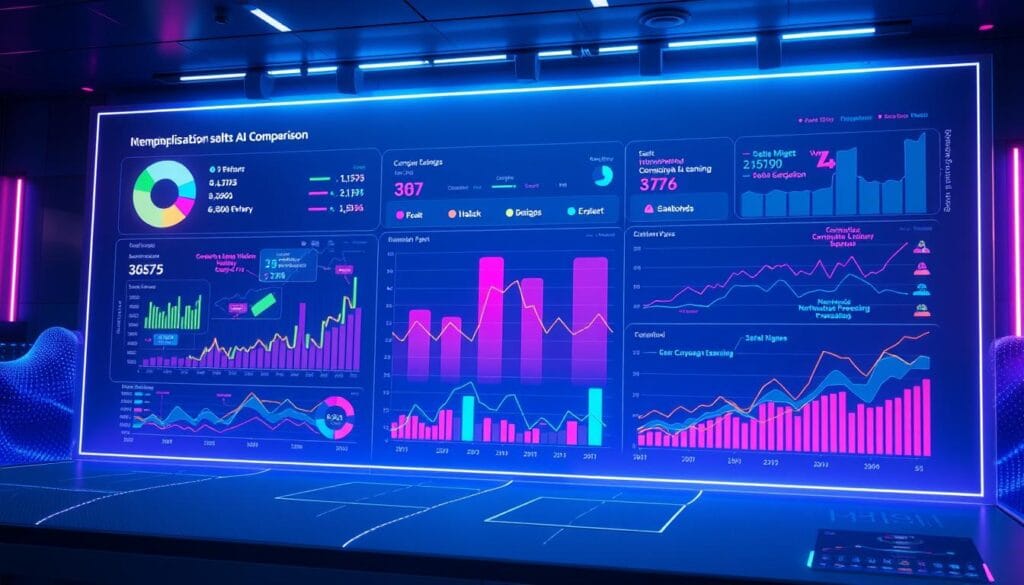Machine learning engineers now earn an average base salary of $164,000 in the U.S. tech sector — surpassing traditional software engineering roles by 28%. This staggering figure reflects how data-driven intelligence careers are reshaping compensation standards across industries.
As organizations prioritize automation and predictive analytics, specialized roles in artificial intelligence dominate salary leaderboards. Positions like computer vision engineers and natural language processing architects now rival executive-level pay scales at Fortune 500 companies.
The demand for technical expertise in neural networks and deep learning frameworks continues to accelerate. Recent industry reports show a 74% year-over-year increase in job postings requiring AI-specific skills, with data science and machine learning competencies being the most sought-after.
This analysis examines compensation trends across critical artificial intelligence domains. From established positions in algorithmic development to emerging opportunities in AI-driven financial systems, we compare market demands, required competencies, and geographical salary variations.
Key Takeaways
- Machine learning engineers lead salary rankings at $164k average base pay
- Specialized AI roles offer 20-35% premiums over general tech positions
- Data science expertise remains critical for high-compensation opportunities
- Emerging fields like quantum machine learning show rapid salary growth
- Technical skills in TensorFlow and PyTorch command 18% salary boosts
AI Career Landscape and Salary Insights

The artificial intelligence employment sector demonstrates unprecedented growth, with specialized engineering roles commanding six-figure compensations across major industries. Machine learning professionals currently average $109,143 annually, while positions focusing on neural network architecture reach $160,757 according to 2024 market analyses.
Current Trends in the AI Job Market
Demand for software development expertise has surged 63% year-over-year as organizations implement intelligent systems. Healthcare, finance, and manufacturing lead adoption rates, creating diverse opportunities for engineers skilled in TensorFlow and cloud-based solutions. Nexford University reports 41% of employers now prioritize certifications in deep learning frameworks during hiring.
Analyzing Salary Data and Demand
Compensation patterns reveal striking disparities between specializations. Natural language processing architects earn 28% more than general data scientists, reflecting the premium on niche technical abilities. Major tech firms dominate hiring, but startups developing quantum computing applications offer competitive equity packages to attract top talent.
Emerging roles in ethical algorithm design and robotic process automation show 90-day growth rates exceeding 17%. Professionals leveraging advanced AI solutions typically achieve senior positions 40% faster than conventional IT career paths. CNBC data confirms cloud engineering skills deliver 22% higher starting salaries in machine learning roles compared to standalone programming competencies.
Key Technologies Shaping Lucrative AI Careers

Three technical domains now dominate compensation growth in intelligent systems development. Machine learning frameworks, natural language processing architectures, and computer vision models collectively account for 68% of high-value engineering roles. These disciplines require mastery of evolving tools like PyTorch and TensorFlow, with proficiency in deep learning models yielding 23% salary premiums.
Core Technical Competencies
Computer vision engineers lead earnings at $168,803 annually, reflecting demand for spatial analysis expertise. Machine learning specialists follow closely at $164,048, with salaries growing 14% over three years. Market data reveals 42% of hiring managers prioritize candidates skilled in transformer models and reinforcement learning techniques.
Project managers overseeing neural network deployments earn 19% more than general tech leads. Compensation aligns with team achievements in algorithm optimization and deployment speed. One Fortune 500 firm recently adjusted technical leadership pay scales quarterly based on model performance metrics.
Continuous adaptation remains critical as new frameworks emerge every 12-18 months. Professionals maintaining certifications in cutting-edge tools secure roles 30% faster than peers relying on legacy skills. Specialized knowledge in multimodal systems now commands 27% higher starting salaries compared to single-discipline experts.
Which AI field pays the most?

Leading tech organizations now set unprecedented salary standards for specialized technical roles. AI product managers at firms such as Netflix and Walmart Labs command $182,587 annually, outpacing traditional engineering positions by 34%. This trend reflects intensified competition for professionals skilled in neural network optimization and predictive modeling.
Top-Paying Roles and Comparative Data
Computer vision engineers remain frontrunners with median earnings of $168,000, closely followed by machine learning architects at $164,500. Data scientists focusing on deep learning frameworks earn 22% more than general analytics specialists. Uber’s recent compensation reports reveal 18% salary growth for roles integrating reinforcement learning techniques into ride-sharing algorithms.
Insights from 2024 and 2025 Market Trends
Emerging fields like ethical AI design show 19% year-over-year compensation increases. Companies like NVIDIA and Tesla now offer stock options worth 40% of base salaries to retain talent developing autonomous systems. Financial institutions are adapting these trends, with fraud detection specialists using machine learning models seeing 27% pay bumps since Q1 2024.
Market projections indicate 14% salary growth for computer vision roles through 2025, compared to 9% for general software engineering. This disparity highlights the premium placed on niche expertise in multimodal systems and transformer architectures. Firms prioritizing applied research capabilities report 31% faster promotions for technical staff versus operational roles.
Industry Insights: Skills, Tools, and Job Requirements
Technical expertise remains the cornerstone of competitive compensation in intelligent systems roles. Employers prioritize candidates with verified proficiency in programming languages like Python (83% of job postings) and Java (67%), according to LinkedIn talent analytics. Advanced mathematics and statistical modeling form the foundation for positions ranging from data scientists to research scientists.
Essential Technical Skills and Qualifications
Product managers in high-paying roles typically require expertise in cloud platforms like AWS and Azure, paired with agile development methodologies. Glassdoor data shows 76% of senior data scientist positions demand TensorFlow or PyTorch mastery, with salaries averaging $156,000 for professionals holding relevant certifications.
Learning engineers combine software development skills with neural network architecture knowledge. Real-time data analysis capabilities separate entry-level roles ($98k average) from senior positions ($164k), particularly in natural language processing applications. Leading firms now require practical experience deploying transformer models at scale.
Emerging Tools and Engineering Practices
Modern teams increasingly adopt multimodal frameworks like OpenAI CLIP and MLOps platforms. Research scientists working with quantum machine learning tools report 23% higher compensation than peers using traditional systems. Continuous integration pipelines for model training have become standard practice at 68% of Fortune 500 tech divisions.
Adaptability proves critical as high-paying roles in intelligent systems evolve. Professionals mastering federated learning systems and ethical AI toolkits secure promotions 40% faster than conventional developers. Salary data confirms these specialized skills deliver 18-31% pay premiums across industries.
Companies Driving High-Paying AI Opportunities
Tech giants and innovative startups are reshaping compensation benchmarks through aggressive talent acquisition strategies. Organizations investing in intelligent systems now offer specialized engineers salaries exceeding $300,000 annually, according to 2024 industry compensation reports.
Market Leaders and Their Compensation Models
Netflix leads in machine learning compensation, offering senior engineers $314,746 base pay for optimizing recommendation algorithms. Walmart Labs structures packages around performance-based stock grants, with computer vision experts earning $285,000 plus 25% annual bonuses. Uber’s reinforcement learning teams receive 18% higher equity than other technical roles, reflecting the premium on real-time decision systems.
OpenAI sets industry standards with $290,000 average salaries for research scientists developing multimodal models. These firms combine competitive base pay with cutting-edge project opportunities, creating environments where technical expertise directly influences earnings growth.
Impact of Big Tech and Startups
Established tech companies dominate salary scales but face competition from startups offering rapid advancement. Early-stage quantum computing firms provide 15-20% equity stakes to attract top talent, while FAANG corporations counter with comprehensive benefits packages. A recent analysis shows engineers at major cloud providers earn 22% more than startup peers, but accept 35% slower promotion cycles.
Financial institutions now mirror these trends, using advanced analytics tools to justify premium salaries for fraud detection specialists. This dynamic market rewards professionals who continuously update skills in neural architecture design and distributed learning systems.
Conclusion
Technical expertise in specialized disciplines continues to drive unprecedented compensation growth. Computer vision engineers and machine learning architects lead earnings at $168,000-$164,500 annually, outpacing general software roles by 28-34%. These figures highlight the premium placed on niche skills like neural network optimization and multimodal system design.
Demand for professionals skilled in natural language processing (NLP) and advanced algorithms remains robust, with salaries growing 14-19% year-over-year. Companies like NVIDIA and Netflix set benchmarks through performance-based equity packages, while startups attract talent with rapid advancement opportunities. Engineering practices now directly influence compensation models, particularly in cloud-based deployments.
Continuous learning separates top earners in this dynamic landscape. Research scientists and engineers maintaining certifications in tools like PyTorch secure promotions 30-40% faster than peers. Understanding company-specific pay structures proves critical when navigating roles in autonomous systems or ethical algorithm design.
For professionals mapping their career trajectories, tools offering tailored career strategies prove invaluable. As quantum computing and transformer architectures evolve, technical leaders who adapt swiftly will dominate the next wave of salary benchmarks across industries.

